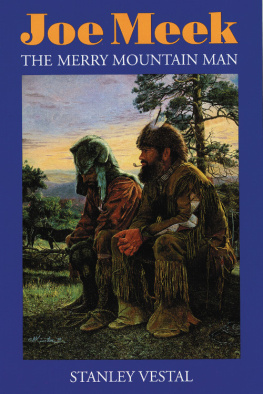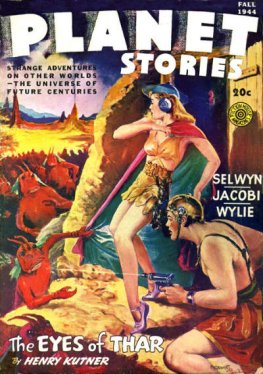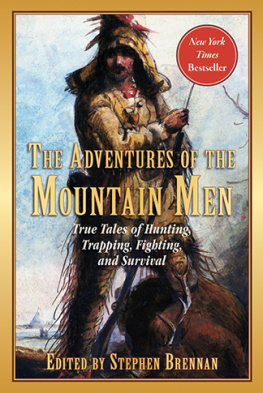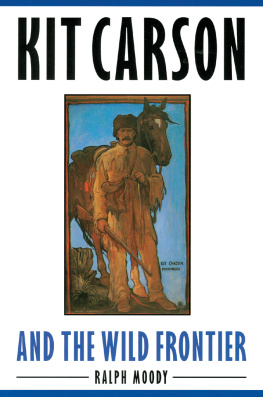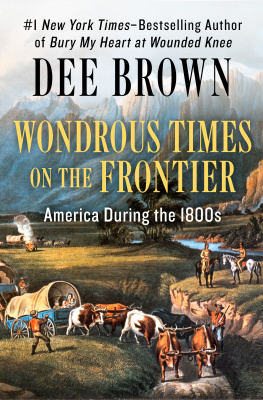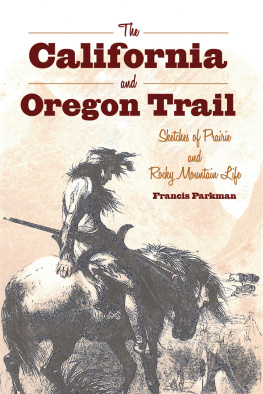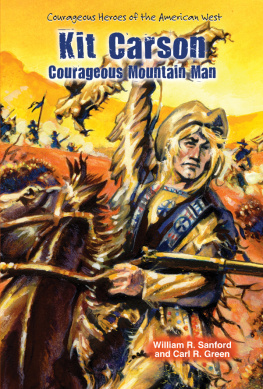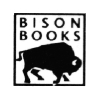
JOE MEEK
The Merry Mountain Man
A B IOGRAPHY
BY
STANLEY VESTAL
University of Nebraska Press / Lincoln and London
Copyright 1952 by the Caxton Printers, Ltd.
Library of Congress catalog card number: 52-5211
International Standard Book Number: 0-8032-5206-4
ISBN-13: 978-0-8032-5206-6 (pbk: alk. paper)
ISBN-13: 978-0-8032-5315-5 (electronic: e-pub)
ISBN-13: 978-0-8032-5316-2 (electronic: mobi)
T O
ELINORE ZARUBA
BECAUSE SHE FIRST SUGGESTED THAT I WRITE THIS BOOK.
Contents
Acknowledgments
E VERYONE who writes of Joseph L. Meek must first of all gratefully acknowledge his debt to Mrs. Frances Fuller Victor and her book The River of the West in which she imbedded his racy memoirs. Since her day, however, much fresh and vital information has been unearthed and published. In particular I am indebted to the research of Mr. H. E. Tobie and his series of articles in the Oregon Historical Quarterly, Vols. XXXIX and XL, entitled Joe Meek, A Conspicuous Personality. Other principal sources will be found in the bibliography of this book.
In addition I gladly acknowledge use of the collections of the historical societies of Oregon, Washington, California, Wyoming, and the Northwestern Canadian provinces.
I wish also to express my hearty thanks to the following individuals: Commissioner of Indian Affairs, Department of the Interior; Superintendent, Crow Agency, Montana; Mr. Carl W. Beck, Superintendent, Fort Hall Agency, Fort Hall, Idaho; Mr. J. M. Cooper, Superintendent, Wind River Agency, Fort Washakie, Wyoming; Mr. Archie Phinney, Superintendent, Northern Idaho Agency, Lapwai, Idaho; Mr. Henry Roe Cloud, Superintendent, Umatilla Indian Agency, Pendleton, Oregon; Mr. Frank H. H. Roberts, Jr., Acting Chief, Bureau of American Ethnology, Smithsonian Institution; Dr. John P. Harrington, linguist on the staff of the Bureau of American Ethnology, Smithsonian Institution; Miss Elizabeth B. Drewry, War Records Office, National Archives; Dr. Clark Wissler, American Museum of Natural History; Mr. M. W. Stirling, Chief, Bureau of American Ethnology, Smithsonian Institution; Miss Alice Lee Parker, Acting Chief, Prints & Photographs Division, Library of Congress; Mr. James C. Olson, Superintendent, Nebraska State Historical Society; Mr. Vernon Kinietz; Mr. Fred Woodard; Mr. Merrill J. Mattes; Mrs. Alice S. Acheson; Mr. George F. Brimlow; Mrs. Frances Franks; Mrs. Elinore Zaruba; Mr. Lancaster Pollard, Superintendent, Oregon Historical Society; Mr. Howard M. Corning, Reference Librarian, Oregon Historical Society; Mr. John Mackenzie Cory, Associate Librarian, University of California, Berkeley, California; Mr. J. L. Rader, Librarian, University of Oklahoma, Norman, Oklahoma; and Mrs. Margaret Roberts, my secretary.
I am also happy to express my gratitude to the publishers listed below for their kind permission to reprint passages from their books as follows: Syms-York Company, Inc., Boise, Idaho for passages quoted from Journal of a Trapper; or, Nine Years in the Rocky Mountains, 18341843 by Osborne Russell; to the Houghton Mifflin Company for quotations from my Mountain Men, Kit Carson, and Fandango.
PART I
GREENHORN
CHAPTER ONE
The Mountain Men
J OE MEEK was a mountain manand proud of it. No wonder. For the mountain men were no ordinary frontiersmen, but picked adventurers who challenged the wilderness and mastered it. Those were the boys who trapped the beaver, lived on bear and buffalo, fought Indians, and caroused away their hard-earned wages. Later, when, a hundred years ago, our American frontier swept swiftly westward from the Mississippi to the Pacific, the mountain men still led the van, serving as guides, scouts, soldiers, peace officers, and statesmen. They were the commandos of our Westward Movement.
In North America the fur trade has always been Big Business. Until the silk hat became the fashion, all the finest hats were made of the fur of beaver, and the pelts of these animals were always in demand abroad. In Canada the Hudsons Bay Company and the other firms which it absorbed pushed westward, established permanent forts and factories all the way to the Pacific. They bartered with the Indians for their peltry.
Such an organization required for its success a monopoly of the business, governmental powers over the Indians and engags, large capital, a network of expensive establishments, and costly staffs of traders, clerks, hunters, mechanics, and voyageurs. In order to maintain these, the British had to conserve the fur-bearing animals and thisthough profitable in the long runnaturally reduced the yearly dividends. The Hudsons Bay Company, therefore, opposed all immigration into their territory and had authority to exclude settlers. Without such authority it must have failed.
Meanwhile, south of the British possessions, the Americans had not been idle. When in 1804, President Jefferson sent Captain Meriwether Lewis and Lieutenant William Clark up the Missouri River and down the Columbia to explore the Louisiana Purchase and the debatable land of Oregon, traders were already in Indian country. And soon after, John Jacob Astor, intent upon monopolizing the American trade, sent his Astorians overland to meet his ship, the ill-fated Tonquin, at the mouth of the Columbia. But Astor met strong competition; the Missouri Fur Company, organized by St. Louis merchants and led by that indefatigable Spaniard, Manuel Lisa, sent their expeditions into the mountains and even beyond into Oregon.
The Indians of the Canadian woods had always been trappers and fell readily enough into the British pattern of fur-culture. Fixed prices, British law and order let the Indian know exactly what to expect, and, if not always happy, he was in the main content. If he made trouble, the Hudsons Bay Company knew how to stop it. The Indian was under their control.
On the American side of the line conditions were very different. The Indians of the Great Plains and the Rockies were horsemen and buffalo hunters, and had no heart at all for paddling about in icy beaver streams for the sake of a few skins. On their fleet ponies they could kill enough buffalo in a day to keep them supplied with food and shelter for months on end. Moreover, they were warriors, raiders, and thought war better business than barter, since glory was thrown in. No man who knew them well could expect them to turn trappers just to oblige the whites.
Moreover, monopoly was abhorrent to liberty-loving Americans trained up in the ways of free enterprise and cutthroat competition. Any man with courage and capital might enter the fur trade in the West, as many did. Government regulation of industry and trade was in those days unthinkable in American territory. Even laws regulating trade with Indians (like those forbidding the introduction of liquor into Indian country) could never be enforced.
Thus, prior to the War of 1812 all was confusion and strife in the fur trade. Treacherous Indians boarded Astors ship, the Tonquin, massacred the crew, and Astoria had to be abandoned; the brigades of the Missouri Fur Company were attacked, decimated, and driven from the Indian country. In Canada the Northwesters fought the Hudsons Bay Company, wreaking vengeance on colonists attempting to settle in their preserves. There was heavy loss everywhere. And it was all Manuel Lisa could manage to keep the Indians of the upper Missouri from joining forces with the British in the war.
But these disasters could not discourage men who had viewed that promised land so rich in fur. In 1822 at St. Louis Major Andrew Henry and General William H. Ashley formed a partnership which in time came to be known as the Rocky Mountain Fur Company, and led their first expedition up the Missouri River, establishing a temporary post at the mouth of the Yellowstone. The next summer treacherous Rees delayed their keelboats at the mouth of Grand River and ambushed their men with heavy loss. Colonel Henry Leavenworths punitive expedition failed miserably to subdue the Rees, who abandoned their palisaded village only to scatter over the Plains and so become more dangerous than ever. These fresh disasters convinced the partners that the British system of fixed trading posts would never pay on our side of the line. They reorganized their brigades on a plan of their own.
Next page
